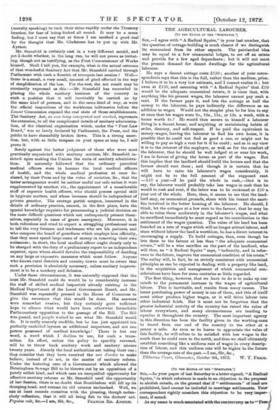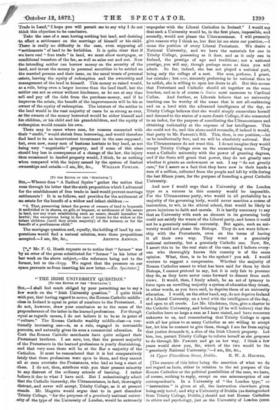[TO TEE EDITOR OF THE "SPECTATOR."]
SIR, —In your paper of last Saturday is a letter signed, "A Radical, Squire," in which reference is made to an objection to the proposal to abolish entails, on the ground that if "settlements" of land are prohibited, land cannot be included in marriage settlements. Your correspondent rightly considers this objection to be very impor- tant, if sound.
As my name is mucheasociated withthe controversy as to "Free
Trade in Land,"1 hope you will permit me to say why I do not think this objectiow.to be conclusive.
Take the case of a man having nothing but land, and desiring .-to affect a settlement on the marriage of himself or his child. There is really no difficulty in the case, even supposing all -"settlements " of land to .be forbidden. It is quite clear that if -we have real "free trade" in land, we must allow mortgages, or conditional transfers of the fee, as well an sales out and out. Now the intending settlor can borrow money on the security of the land, and invest the money in personal securities to be settled on the married persons and their issue, on the usual trusts of personal testate, leaving the equity of redemption and the ownership and management of the land in himself. This money so raised would, as a rule, bring even a larger income than the land itself, but the settlor can act as owner without hindrance, as he can at any time sell and pay off the debt from the purchase-money, and if he improves the estate, the benefit of the improvements will be his as owner of the equity of redemption. The interest of the settlor in the land would in the vast majority of cases be as strong as ever, as the owners of the money borrowed would be either himself and lila children, or his child and his grandchildren, and the equity of .redemption would remain his own.
There may be cases where men, for reasons connected with their "credit," would shrink from borrowing, and would therefore find land to be an inconvenient investment in the case supposed ; but, even now, many men of business hesitate to buy laud, as not -being very " negotiable " property, and if some of this class should buy less in consequence of a change of the law, the injury thus occasioned to landed property would, I think, be as nothing when compared with the injury, caused by the system of limited
:ownerships and entails.—I am, Sir, &c., Wu.Lrem FOWLER.



































 Previous page
Previous page